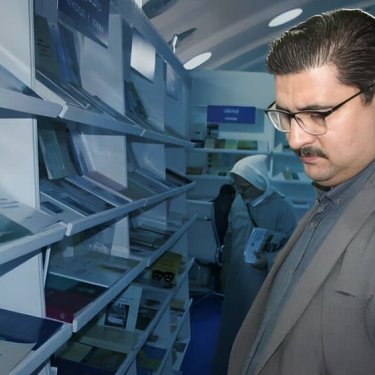Criminal defamation charges against editor highlight repressive climate in Morocco

Reporters Without Borders (RSF) calls for the withdrawal of all charges against a news website editor in Oujda, the capital of northeastern Morocco’s Oriental region, who is facing the possibility of several years in prison on a charge of defaming the region’s wali (prefect) in a trial due to open in Oujda tomorrow (19 October).
The editor of Chamspost, a website covering regional general news, and former regional correspondent of the now closed national daily Akhbar El Youm, Abdelmajid Amyay was arrested in a café in Oujda on 5 October and was immediately taken to regional police headquarters for questioning.
His lawyers, Mourad Zibouh, Mohamed El Ayadi, Mourad Mokhtari and Zakaria Souidi, were made to wait for hours before being allowed to visit him. He was eventually released on bail after spending more than 24 hours in police custody.
Amyay is being prosecuted under two articles of Morocco’s penal code. One is article 447-2, under which “defaming and disseminating or distributing information relating to the private lives of persons without their consent” is punishable by 6 months to 3 years in prison. The other is article 263, under which “intent to undermine [a person’s] honour or propriety or the respect due to their authority, or contempt in the exercise of their functions” is punishable by one month to one year in prison.
He was arrested after a Facebook post in which he shared a photo of an article in the national daily Al Ahdath that was headlined “Sahara’s Escobar” and accused the president of the Oriental region’s council of corrupt practices. A few days before that, he posted content on Facebook that, without naming names, was critical of the Oriental region’s management.
According to one of his lawyer’s, Mourad Mokhtari, he is being prosecuted in connection with these Facebook posts as a result of a complaint brought by the Oujda’s region’s wali, although the wali himself was not targeted by the posts.
“These penal code provisions are clearly being interpreted in an extremely elastic and draconian manner. The journalist Abdelmajid Amyay showed caution and restraint in his posts critical of the Oriental region’s management, given that sharing a newspaper article cannot in any way constitute a crime. We reiterate our calls for respect for freedom of expression, which is increasingly being undermined by constant judicial harassment of those who criticise and speak out.
Mokhtari told RSF: “The proceedings initiated against the journalist Abdelmajid Amyay in connection with his blog posts constitute a step backwards from the latest developments in the law on press and publishing, and a perpetuation of the process of restricting press freedom in Morocco. His defence team regards the prosecution as invalid and insists on his innocence.”
Amyay is not the only journalist currently being subjected to intimidatory judicial proceedings by the Moroccan authorities. Hanane Bakour, the former editor of the AlYaoum24 news site, is being sued for defamation by Aziz Akhannouch, the current prime minister, in connection with critical Facebook posts. After 11 postponements in two years, the case is currently due to be heard by a Rabat-Salé court on 11 December.
